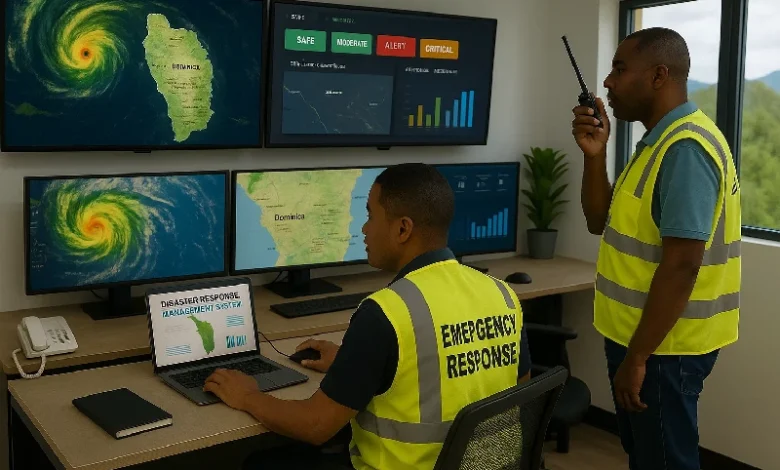Comprehensive Disaster Management (CDM) Bill of Dominica

The Comprehensive Disaster Management (CDM) Bill is a proposed legislative instrument designed to modernize Dominica’s disaster management architecture, replacing outdated provisions and integrating contemporary international best practices. Rooted in the region-wide CDM approach endorsed by the Caribbean Disaster Emergency Management Agency (CDEMA), this Bill fills gaps left by legacy laws, better aligns Dominica’s framework with international standards, and formalizes coordination with global humanitarian and public health actors.
Drafted initially in 2013 under the CDM Harmonized Implementation Programme and refined after Tropical Storm Erika in 2015, this Bill received further public consultation, including contributions from the Dominica Red Cross in 2019. Though still pending Cabinet approval and parliamentary introduction, it holds significant promise to reshape national resilience mechanisms.
Legislative Objectives and New Institutional Framework
The CDM Bill aims to:
- Establish a permanent Directorate of Disaster and Emergency Management with clear legal authority
- Integrate risk reduction, response, recovery, and climate adaptation across sectors
- Provide a domain for international coordination, including visas, customs exemptions, and regulatory entry for foreign responders
In operationalizing these objectives, the Bill creates a National Advisory Council and a Coordination Mechanism that streamlines involvement of government ministries, NGOs, private sector, and international agencies, replacing the complex and overlapping mandates under the old National Emergency Planning Organisation (NEPO).
The legislation also mandates regulations for:
- Early warning systems
- Volunteer registration
- Shelter protocols
- Evacuation orders
- Disaster relief administration
Together, these subordinate regulations provide clarity for both immediate response and long-term resilience planning.
Improved Coordination of International Assistance
One of the Bill’s standout advances is its dedicated coverage of international disaster relief:
- It designates the Director of ODM as the International Humanitarian Assistance Coordinator, offering a single governmental touchpoint.
- It formalizes visa, customs, import, and duty waivers for international responders, based on the International Disaster Response Law (IDRL) Guidelines, marking a major improvement over fragmented emergency protocols.
- It recognizes the importance of public health emergencies, requiring that disease outbreaks be seamlessly integrated into national procedures and matched with WHO/PAHO guidelines.
These additions address challenges highlighted during responses to Hurricane Maria and COVID-19, when coordination of ad-hoc international assistance proved inconsistent.
Streamlined Institutional Mandates
Under the current system, disaster governance is divided among multiple bodies, NEPO, Office of Disaster Management (ODM), Ministry of Foreign Affairs, Customs, and Dominica Red Cross, often creating confusion during emergencies. The CDM Bill consolidates decision-making by:
- Clearly defining roles for government agencies and task forces
- Empowering the Disaster Directorate to lead, train, and coordinate national disaster initiatives
- Aligning local authorities and private sector participants through structured reporting and planning channels
This harmonized structure addresses recurring criticisms of “unduly complex” coordination and undefined NGO roles.
Regular Review, Monitoring, and Legal Flexibility
The Bill introduces mechanisms for:
- Annual disaster risk and vulnerability assessments
- Regular public reporting on disaster financing and preparedness
- Mandatory updating of disaster regulations every 3 years
In line with CDEMA guidance, it facilitates both legal stability and adaptability. Complemented by Early Warning, Volunteer, and Evacuation Regulations, the law integrates guidelines from the CDEMA Model CDM Legislation (2010 and 2014) and is compatible with frameworks like the Sendai Framework.
Advancing Legal Preparedness and Resilience
By receiving funding from CDEMA/EU to develop and refine this draft law, Dominica demonstrated its commitment to governance reform and disaster readiness. Once enacted, the Bill will:
- Reduce delays in emergency activation
- Clarify delegation during major disaster responses (including foreign aid flows)
- Strengthen public-sector accountability through statutory reporting
- Institutionalize resilience strategies across governance, planning, and finance.
Challenges Ahead and Reform Dynamics
The Bill must still overcome:
- Overlapping authorities from existing disaster agencies and laws
- Institutional resistance to change and resource allocation demands
- A reliance on fragmented regulatory frameworks for full implementation
To maximize impact, stakeholders recommend:
- Codification of NGO and volunteer accreditation
- Consolidation of institutional mandates under the Directorate
- Direct linkage between disaster financing (e.g., Contingencies Fund) and statutory budgets
Cdema reports following Erika emphasized the need for clear cluster leads and registration systems for international responders, both addressed in the Bill’s regulations.




